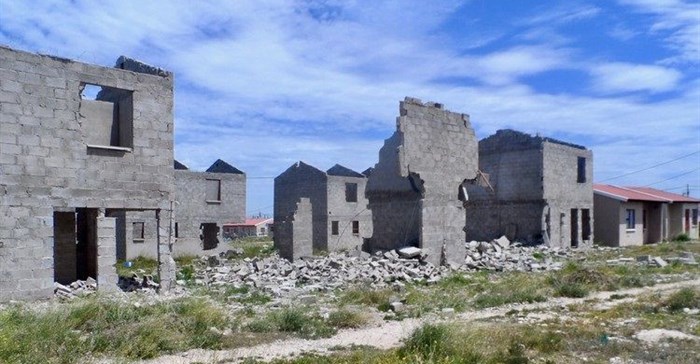The Department of Human Settlements earlier this week said it will be taking legal action against officials across the country who oversaw the construction of poor houses. It cited the construction of 162 duplex flats in Port Elizabeth, which were poorly built and have to be demolished.

The NU29 project was commissioned in 2014 to benefit poor families in the metro. Construction was abandoned halfway, leaving many unfinished flats. Photo: Joseph Chirume
Director general Mbulelo Tshangana, speaking at a three-day indaba on human settlements in Port Elizabeth, laid the blame on officials from the Eastern Cape department, the Nelson Mandela Bay Municipality, as well as officials of the National Home Builders Registration Council (NHBRC) for the poor construction of the duplexes in Motherwell.
The NU29 project was commissioned in 2014 to benefit poor families in the metro. Construction was abandoned halfway, leaving many unfinished flats.
Tshangana said an investigation had been done. “There were wrongs done by the municipality and the province. There are inspectors from the NHBRC who did not do their job properly … We have to start with a disciplinary process. Those contractors who are registered with the NHBRC and did not do their work properly, we are after them. By law, we are allowed to blacklist them. The officials who appointed contractors not registered with the NHBRC, we have to go after them as well.”
Stricter conditions
NHBRC CEO Mziwonke Dlabantu said his organisation will only work with registered contractors who can also be traced if a problem arises. “I am shocked to hear that it has turned out to be a matter of non delivery … In the last two years there has been much stricter conditions. A new bill is under way that enforces provision of quality services.”
Dlabantu said houses will be fully insured for the first five years, with one year insurance cover for structural defects. He said all contractors will have to be qualified and registered with his organisation.
Tshangana said municipalities should accelerate provision of land to settle people because many were migrating to towns and cities. “We don’t promote land invasions. It is illegal to invade land. In this country the rule of law is supreme. Everything has to be done within the ambit of the law. Municipalities should make serviced land available.
“Informal settlements and land invasions are symptoms of a bigger problem, namely urbanisation. Cities are not coping so we need to start identifying pockets of land for human settlement purposes,” said Tshangana.
Article originally published on GroundUp.








































